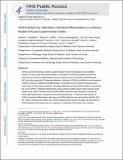| dc.contributor.author | Sanderlin, Edward J. | |
| dc.contributor.author | Leffler, Nancy R. | |
| dc.contributor.author | Lertpiriyapong, Kvin | |
| dc.contributor.author | Cai, Qi | |
| dc.contributor.author | Hong, Heng | |
| dc.contributor.author | Oswald, Joani Zary | |
| dc.contributor.author | Justus, Calvin R. | |
| dc.contributor.author | Krewson, Elizabeth A. | |
| dc.contributor.author | O’Rourke, Dorcas | |
| dc.contributor.author | Yang, Li V. | |
| dc.contributor.author | Bakthavatchalu, Vasudevan | |
| dc.contributor.author | Fox, James G | |
| dc.date.accessioned | 2018-09-06T18:58:05Z | |
| dc.date.available | 2018-09-06T18:58:05Z | |
| dc.date.issued | 2016-12 | |
| dc.date.submitted | 2016-11 | |
| dc.identifier.issn | 0925-4439 | |
| dc.identifier.uri | http://hdl.handle.net/1721.1/117655 | |
| dc.description.abstract | GPR4 is a proton-sensing G protein-coupled receptor that can be activated by extracellular acidosis. It has recently been demonstrated that activation of GPR4 by acidosis increases the expression of numerous inflammatory and stress response genes in vascular endothelial cells (ECs) and also augments EC-leukocyte adhesion. Inhibition of GPR4 by siRNA or small molecule inhibitors reduces endothelial cell inflammation. As acidotic tissue microenvironments exist in many types of inflammatory disorders, including inflammatory bowel disease (IBD), we examined the role of GPR4 in intestinal inflammation using a dextran sulfate sodium (DSS)-induced acute colitis mouse model. We observed that GPR4 mRNA expression was increased in mouse and human IBD tissues when compared to control intestinal tissues. To determine the function of GPR4 in intestinal inflammation, wild-type and GPR4-deficient mice were treated with 3% DSS for 7 days to induce acute colitis. Our results showed that the severity of colitis was decreased in GPR4-deficient DSS-treated mice in comparison to wild-type DSS-treated mice. Clinical parameters, macroscopic disease indicators, and histopathological features were less severe in the DSS-treated GPR4-deficient mice than the DSS-treated wild-type mice. Endothelial adhesion molecule expression, leukocyte infiltration, and isolated lymphoid follicle (ILF) formation were reduced in intestinal tissues of DSS-treated GPR4-null mice. Collectively, our results suggest GPR4 provides a pro-inflammatory role in the inflamed gut as the absence of GPR4 ameliorates intestinal inflammation in the acute experimental colitis mouse model. Keywords: GPR4; Inflammatory bowel disease (IBD); Acidosis; Endothelial cell; Inflammation | en_US |
| dc.publisher | Elsevier | en_US |
| dc.relation.isversionof | http://dx.doi.org/10.1016/J.BBADIS.2016.12.005 | en_US |
| dc.rights | Creative Commons Attribution-NonCommercial-NoDerivs License | en_US |
| dc.rights.uri | http://creativecommons.org/licenses/by-nc-nd/4.0/ | en_US |
| dc.source | PMC | en_US |
| dc.title | GPR4 deficiency alleviates intestinal inflammation in a mouse model of acute experimental colitis | en_US |
| dc.type | Article | en_US |
| dc.identifier.citation | Sanderlin, Edward J. et al. “GPR4 Deficiency Alleviates Intestinal Inflammation in a Mouse Model of Acute Experimental Colitis.” Biochimica et Biophysica Acta (BBA)- Molecular Basis of Disease 1863, 2 (February 2017): 569–584 © 2016 Elsevier B.V. | en_US |
| dc.contributor.department | Massachusetts Institute of Technology. Division of Comparative Medicine | en_US |
| dc.contributor.mitauthor | Bakthavatchalu, Vasudevan | |
| dc.contributor.mitauthor | Fox, James G | |
| dc.relation.journal | Biochimica et Biophysica Acta (BBA) - Molecular Basis of Disease | en_US |
| dc.eprint.version | Author's final manuscript | en_US |
| dc.type.uri | http://purl.org/eprint/type/JournalArticle | en_US |
| eprint.status | http://purl.org/eprint/status/PeerReviewed | en_US |
| dc.date.updated | 2018-08-29T17:39:53Z | |
| dspace.orderedauthors | Sanderlin, Edward J.; Leffler, Nancy R.; Lertpiriyapong, Kvin; Cai, Qi; Hong, Heng; Bakthavatchalu, Vasudevan; Fox, James G.; Oswald, Joani Zary; Justus, Calvin R.; Krewson, Elizabeth A.; O’Rourke, Dorcas; Yang, Li V. | en_US |
| dspace.embargo.terms | N | en_US |
| dc.identifier.orcid | https://orcid.org/0000-0001-9307-6116 | |
| mit.license | PUBLISHER_CC | en_US |
